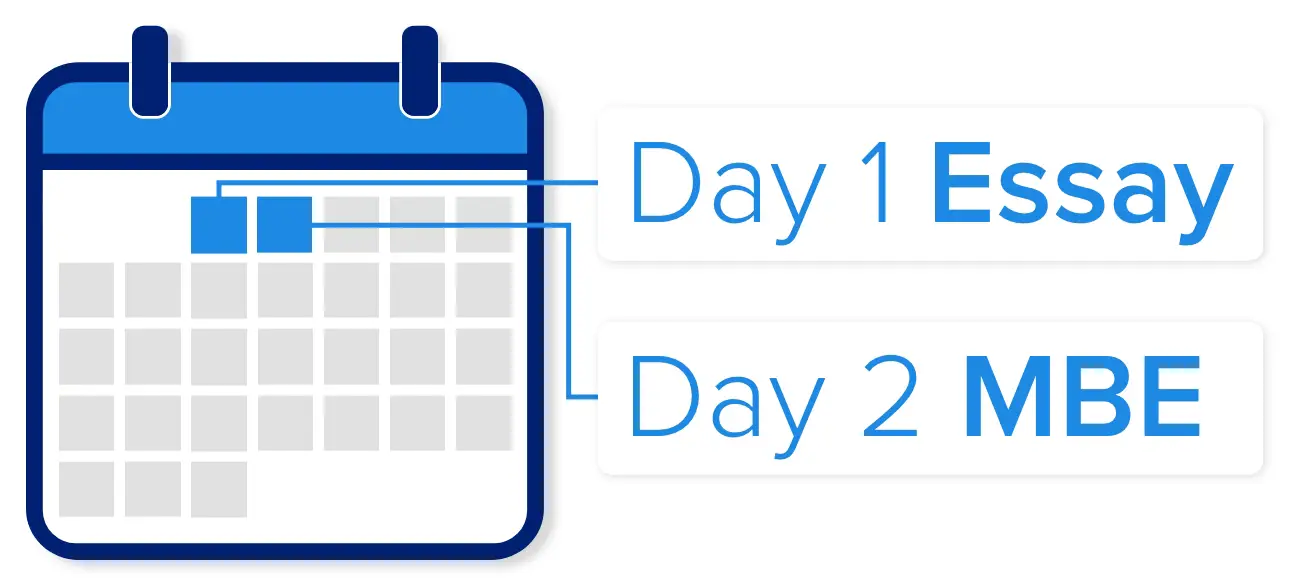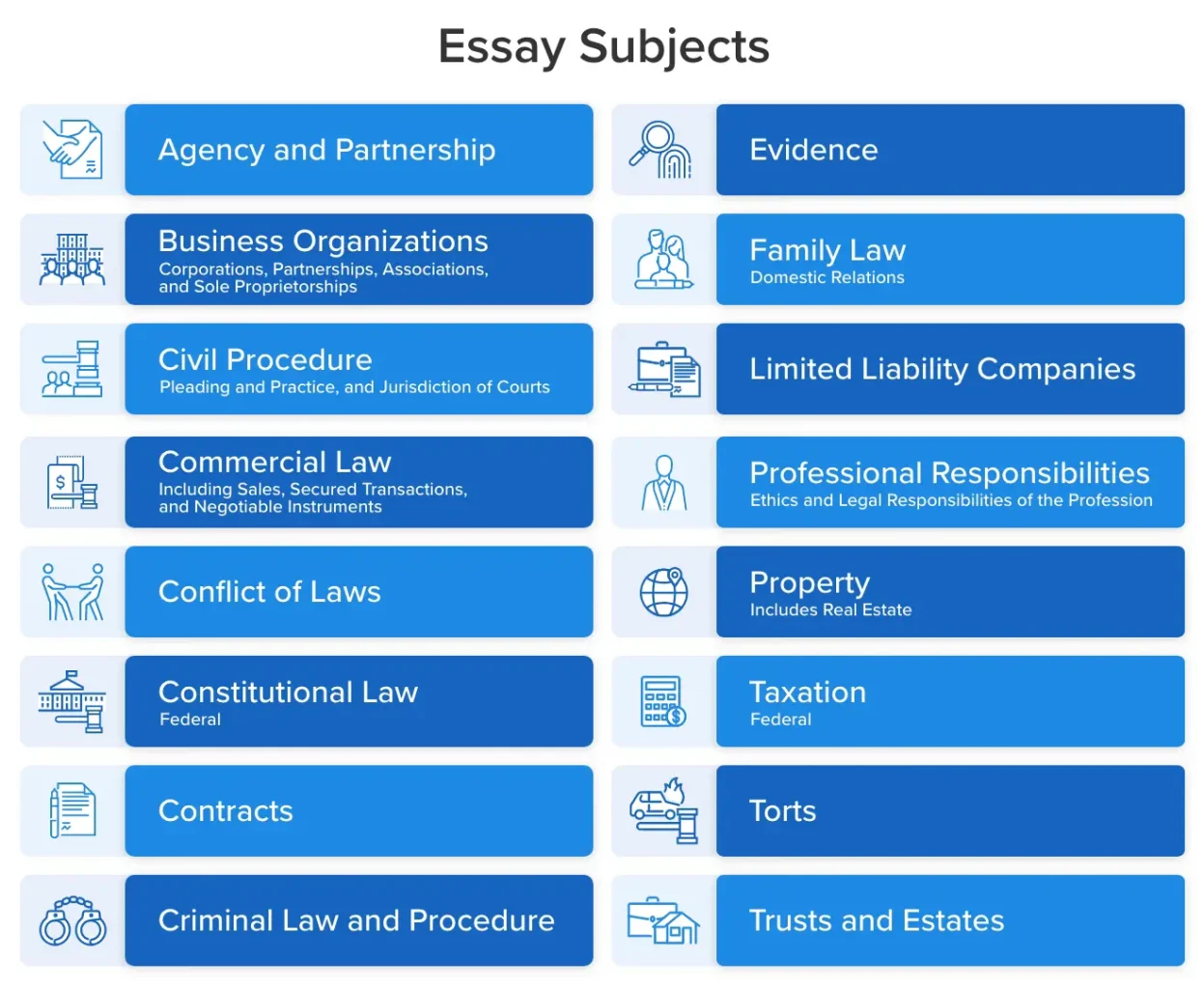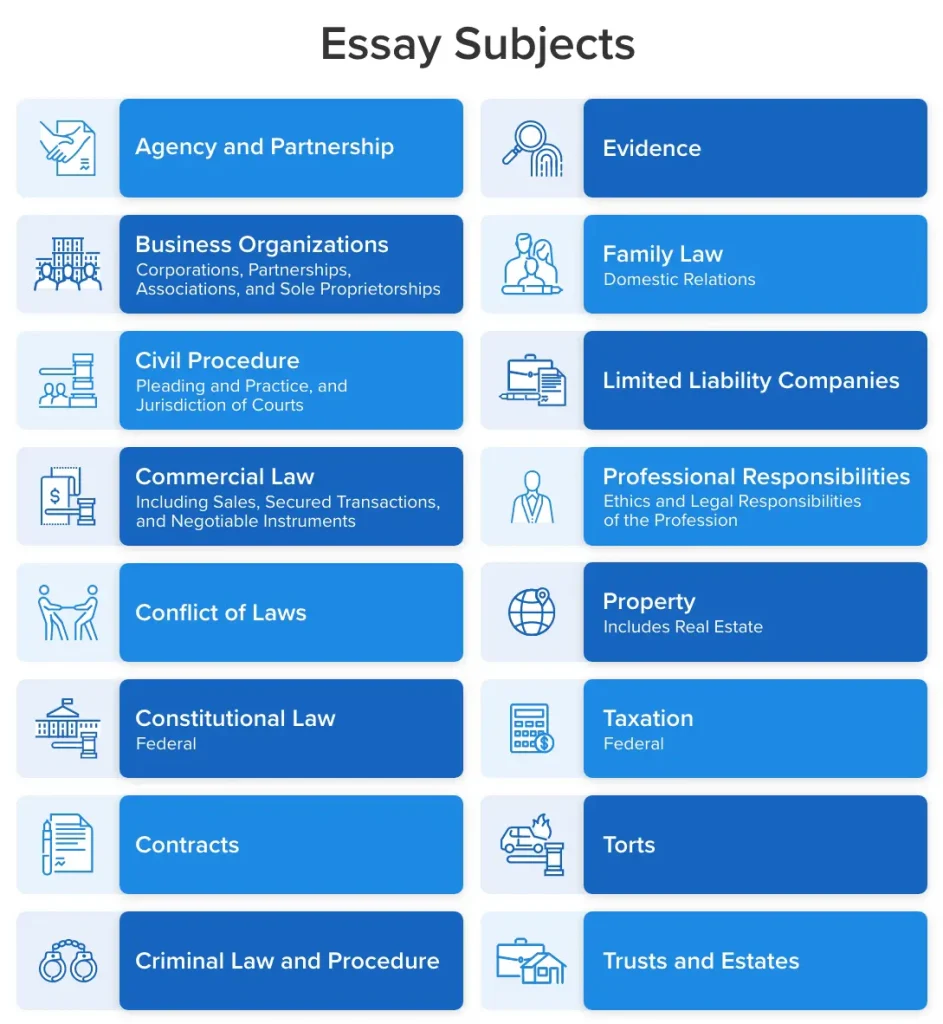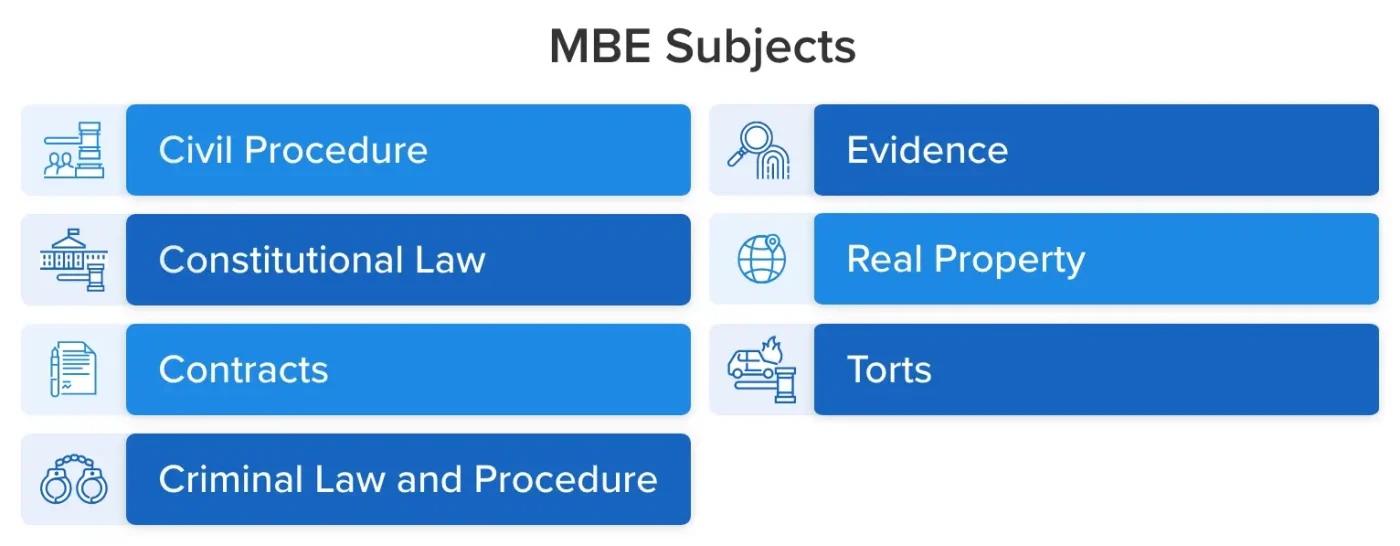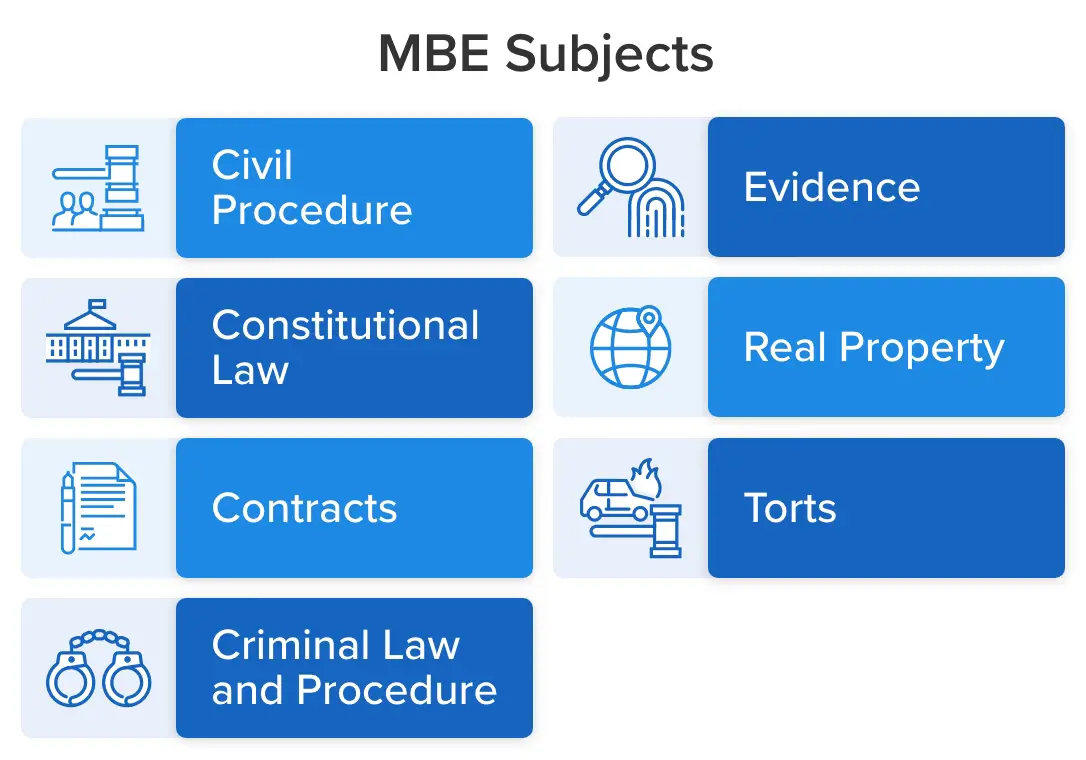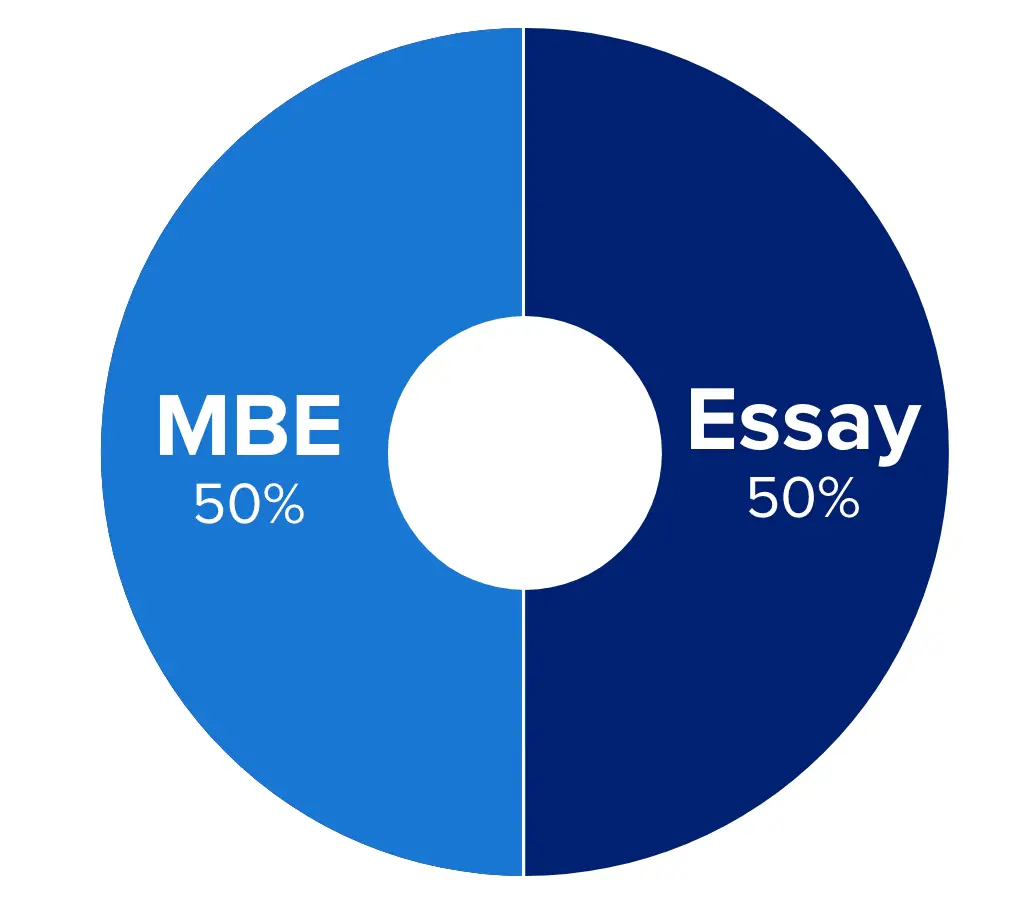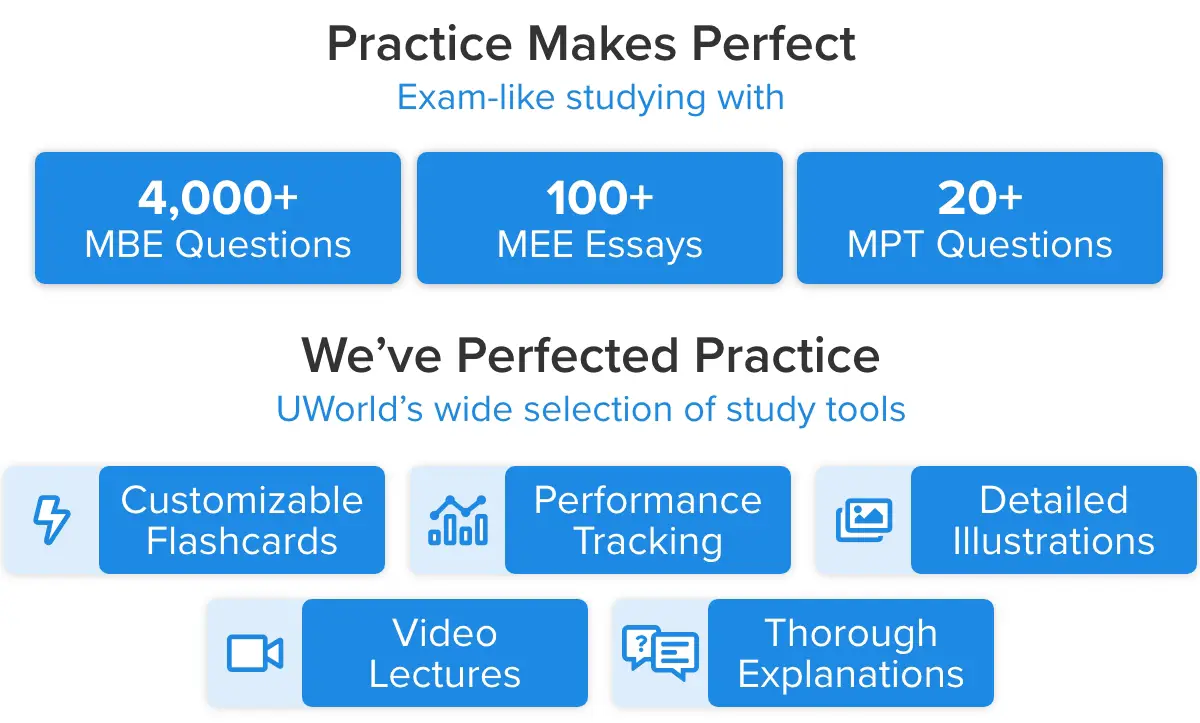The Wisconsin Bar Exam
The Wisconsin Bar Exam has two components—the Multistate Bar Examination (MBE®) and a Wisconsin essay portion. The essay portion may borrow items from the Multistate Essay Examination (MEE®) and the Multistate Performance Test (MPT®). Like the MBE, the MEE and MPT are part of the Uniform Bar Examination (UBE®) and are prepared by the National Conference of Bar Examiners (NCBE®). However, Wisconsin has not adopted the UBE, so the essay component also includes questions prepared by the Wisconsin Board of Bar Examiners.
As one of the 15 remaining US jurisdictions that have not adopted the UBE, the Wisconsin Bar Exam is unique. Fortunately, this article details everything you need to know about this difficult bar exam. Read on to learn about the Wisconsin Bar Exam's pass rates, application deadlines, eligibility requirements, reciprocity, score transfer, fees, subjects, format, and more.
Wisconsin Bar Exam Structure
The Wisconsin Bar Exam is administered over two days from 9 am to 4:30 pm (UTC-6). Each day is dedicated to one component of the exam:
Wisconsin essay exam
The Wisconsin essay exam is weighted at 50%. On day one, examinees will answer MEE and MPT items and items developed by the Wisconsin Board of Bar Examiners.
MBE
The MBE is weighted at 50% of the WI Bar Exam. Examinees will answer 200 multiple-choice questions on day two.
Wisconsin Bar Exam Dates, Requirements, and Scheduling
There are two filing periods for applying to the Wisconsin Bar Exam. It’s highly recommended that you gather all required documents and submit your application before the early filing deadline to avoid a $200 late filing fee. See below for details regarding deadlines and filing periods.
Exam dates
All forms must be filed electronically with the Board by May 1 or December 1 for the July and February exams, respectively.
| Filing Deadlines | February 27-28, 2024 | July 30-31, 2024 | Fee |
|---|---|---|---|
| Early Filing | December 1 | May 1 | $450 |
| Final Filing | January 1 | June 1 | $650 |
Requirements
To sit for the Wisconsin Bar Exam, you must have graduated from an American Bar Association (ABA)-approved law school with a Juris Doctor degree (JD). Graduates from non-ABA-accredited law schools may sit for the exam if they have passed a bar exam and been admitted to the bar in another US jurisdiction.
Scheduling
To register and schedule your appointment for the Wisconsin Bar Exam, you must create an eCourts account and fill out the applicant questionnaire. You’ll need an NCBE number, so create an account if you don’t have one. Your law school must directly submit your final transcript or a dean’s certificate to the Wisconsin Board of Bar Examiners. Graduates from non-ABA-approved law schools must submit a certificate of good standing (or certificate of admission). You will also be required to upload a passport style headshot taken within 6 months of your application and submit an Authorization and Release form.

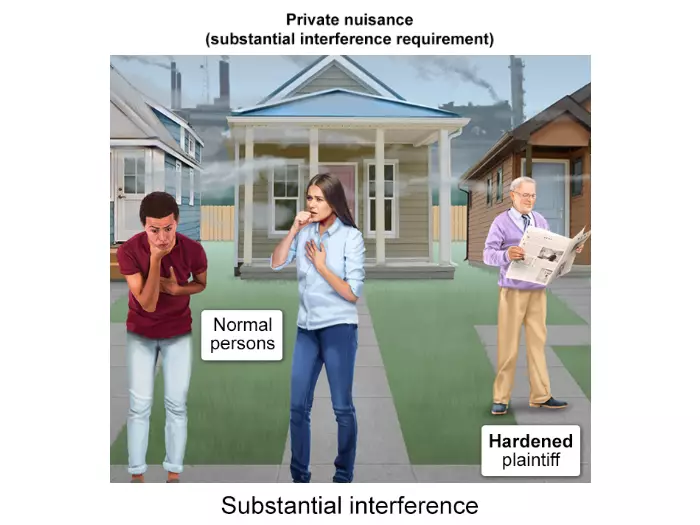
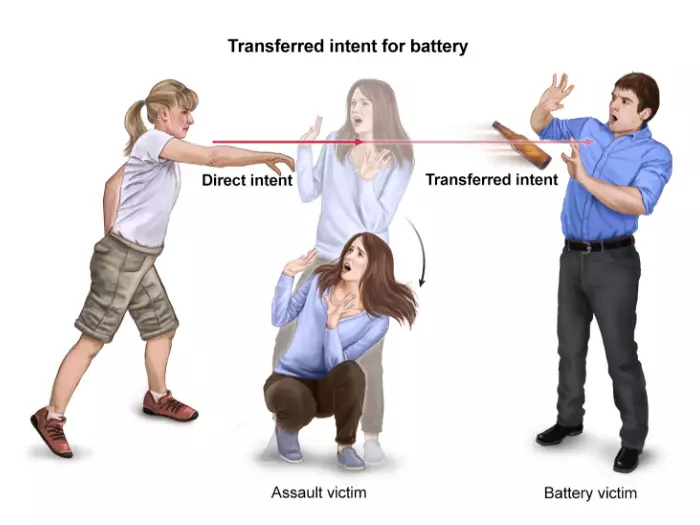
Wisconsin Bar Exam Cost and Fees
Individuals who file after early filing must pay an additional $200 application fee. See the table below for all Wisconsin Bar Exam costs and fees.
| Application Fees | |
| First Time Applicants | $450 |
| Repeat Takers | $450 |
| Foreign Applicants | $850 |
| Late Fees | |
| Late Filing | $200 |
| Character and Fitness Investigations | $200 |
| Other Application Fees | |
| Application for Admission on Proof of Practice | $850 |
| Character and Fitness Investigations | $210 |
| Fees for Laptops | $125 |
Payment Policies
Application filing fees may be submitted electronically with your online application, or by check or money order made payable to the Board of Bar Examiners to:
| Mailing Address |
Board of Bar Examiners |
Check or money orders must include your name. Your application will not be accepted until payment is received.
Cost-Saving Options
Fees associated with applying for the Wisconsin Bar Exam run into the hundreds of dollars. Fortunately, there are cost-saving options available for eligible candidates. The Wisconsin Law Foundation is the charitable arm of the State Bar of Wisconsin and awards several scholarships.
Furthermore, the Wisconsin Department of Veterans Affairs (WDVA) provides fee waivers for qualified veterans. To qualify, a veteran must be a resident of Wisconsin and have served under honorable conditions for at least one year in the US armed forces or the national guard.
If you don't qualify for the above cost-saving options, you can browse the AccessLex Institute Law School Scholarship Databank for cost-saving options suited to you. Furthermore, the ABA offers 100+ opportunities and programs for young lawyers and law students annually.
There are also some simple actions you can take to save money as you work toward bar admission:
- Join a study group and split the cost of bar exam preparation materials among group members.
- Research free or low-cost study online study materials like past bar exam questions and answers to supplement commercial study aids.
- Some bar exam prep companies offer discounts or promotions to students who register early or refer friends to their program.
Wisconsin Bar Exam Subjects and Topics
The Wisconsin Bar Exam is unique. It has not adopted the UBE but does use items from all three UBE components. It has adopted the entire MBE while cherry-picking items from the MEE and MPT. See below for details on possible subjects covered in the Wisconsin Essay Exam and MBE.
Testable Subjects on Wisconsin Essay Exam
The Wisconsin Essay Exam could include items from the MEE and MPT alongside items developed by the Wisconsin Board of Bar Examiners. An MPT item will consist of a closed-universe practical task with instructions, factual data, cases, statutes, and other reference material supplied by examiners. These tasks are designed for examinees to demonstrate their lawyering skills, using only the materials provided by the bar examiners. In contrast, MEE questions involve questions related to one or more of the subjects listed below.
Some subjects may be paired together. Other subjects could be omitted. Remember that the Wisconsin Board of Bar Examiners also develops its own essay questions. Check out our MEE Subject Matter Outline for detailed explanations of MEE subjects and sub-topics.
Testable Subjects on the MBE
The MBE is administered from 9 am to 4:30 pm on the second day of the bar exam. It is scored on a 200-point scale and presents candidates with 200 multiple-choice questions spanning 7 MBE subjects. There are 25 questions per subject, with an additional 25 unscored pilot questions for future exams. There is no way to tell which questions are scored and which are unscored, so answer each question carefully. Possible subjects include:
Wisconsin Bar Exam Scoring/Grading
The combined minimum passing score for the Wisconsin Bar Exam in 258. Each component—the MBE and the Essay portion—is worth 50% of your total score. This means that you should aim for a scaled score of 129 on the MBE. Note that getting 129 of 200 MBE questions correct does not necessarily mean you've earned 129 scaled points. Scaled scoring is a method used to ensure that everyone's exam is judged fairly. Imagine that you and a friend take the bar exam during different administrations, and your exam turns out to be more difficult. It would be unfair to allow someone to pass or fail based on the relative difficulty of their exam version. Therefore, examinees' raw scores are translated into scaled scores.
Wisconsin MPRE Minimum Passing Score
Wisconsin does not require the candidate to have taken or passed the Multistate Professional Responsibility Exam (MPRE®) to be admitted to the Wisconsin State Bar.
Wisconsin Bar Exam Results and Pass Rates
As is common with bar exams across the United States, the Wisconsin Bar Exam's pass rate for repeaters is considerably lower than for those taking it for the first time. This is likely because many repeat takers don't substantially modify their study habits.
| Exam | Overall Pass Rate |
First-Timer Pass Rate |
Repeater Pass Rate |
Results Release Date |
|---|---|---|---|---|
| July 2023 | 58% | 69% | TBA | August 28 |
| Feb. 2023 | 42% | 67% | 17% | N/A |
Below are the annual pass rates for the Wisconsin Bar Exam since 2017 divided into first-time examinees and repeaters:
| Exam | First Timers | Repeaters | Overall | |||
|---|---|---|---|---|---|---|
| Year | No Of Candidates |
Pass Rate |
No. Of Candidates |
Pass Rate |
No. Of Candidates |
Pass Rate |
| 2022 | 132 | 63% | 55 | 25% | 187 | 51% |
| 2021 | 144 | 74% | 62 | 27% | 206 | 60% |
| 2020 | 153 | 75% | 63 | 24% | 216 | 60% |
| 2019 | 133 | 71% | 68 | 32% | 201 | 58% |
| 2018 | 153 | 71% | 49 | 39% | 202 | 63% |
| 2017 | 170 | 77% | 48 | 40% | 218 | 69% |
*Aggregate exam scores for 2023 have not yet been released.
Wisconsin Bar Exam Results
Wisconsin typically releases bar exam results six weeks after an exam administration. The July 2023 exam results were released on August 28, 2023.
What Makes the Wisconsin Bar Exam Unique?
Where bar admission is concerned, Wisconsin is a unicorn. The Board of Bar Examiners allows admission based on diploma privilege, meaning that an applicant is admitted to the bar based on having been awarded their first professional degree in law from an ABA-approved law school in Wisconsin. In short, you can become a lawyer in Wisconsin simply by graduating from an approved Wisconsin law school. Those who have not graduated from such a law school may still be admitted through examination or proof of practice.
Wisconsin Bar Exam Reciprocity
Admission on Proof of Practice Elsewhere is not based on reciprocity in Wisconsin. Instead, candidates can apply for admission without examination if they can prove that they have been substantially engaged in the practice of law in any US jurisdiction for 3 of the 5 years preceding application submission. Applicants who have failed the Wisconsin Bar Exam are not eligible for Admission on Proof of Practice Elsewhere (SCR 40.055).
Wisconsin bar exam for foreigners
Foreigners may sit for the Wisconsin Bar Exam if they have obtained a law degree from a jurisdiction where the law is based on the principles of English Common Law and have been actively engaged in the practice of law for a minimum of 3 of the 10 years leading up to their application. Alternatively, they may have obtained a Masters of Law (LLM) from a law school that was recognized by a competent accreditation agency after completing 24 semester credit hours and 700 minutes of instruction time (see SCR 40.055 for details). Foreigners may also qualify for admission without examination if they have been admitted to practice law in another US jurisdiction.
Final Takeaways
The Themis + UWorld full bar review bundle offers 4000+ MBE practice questions, including recent National Conference of Bar Examiners (NCBE®) licensed questions. Each question has been carefully crafted by our in-house team of legal professionals or is licensed by the NCBE.
Access 100+ MEE practice essays and dozens of MPT practice questions from past bar exams. In addition, our platform offers customizable flashcards, performance tracking, answer explanations filled with vivid illustrations and charts, readings paired with easily digestible 10-15 video lectures, and thorough explanations for every answer choice.
The WI State Bar Exam will be a challenging experience. But we are confident that if you prepare with the right bar prep review, you can perform well on the MBE and pass the bar exam.
Contact Details of the Wisconsin State Bar
If you wish to contact the Wisconsin State Board of Law Examiners office with inquiries regarding the Wisconsin Bar Exam, please see the details below.
| Medium | Info |
| Phone Number | (608) 266-9760 |
| Bar Exam | [email protected] |
| Diploma Privilege | [email protected] |
| Proof of Practice | [email protected] |
| Mailing Address | Board of Bar Examiners 110 East Main Street, Suite 715 PO Box 2748 Madison, WI 53701 |
Wisconsin Bar Exam FAQs
Can anyone take the bar exam in Wisconsin?
How long is the bar exam in Wisconsin?
What are Wisconsin Bar Exam application deadlines and fees?
How hard Is the Wisconsin Bar Exam?
How long does it take to study for the Wisconsin Bar Exam?
What is the minimum passing UBE score for Wisconsin?
How many times can I take the Wisconsin Bar Exam?
How much does it cost to retake the Wisconsin Bar Exam?
Does Wisconsin offer reciprocity with any jurisdiction?
Wisconsin does not offer formal reciprocity with other jurisdictions, but candidates can be accepted to the WI Bar without examination if they can prove that they have been substantially engaged in the practice of law in any US jurisdiction for 3 of the 5 years preceding application submission. See “Reciprocity”.
Can I transfer my MBE score from another jurisdiction to Wisconsin?
Can I transfer my Wisconsin UBE score to another jurisdiction?
What is the time limit for accepting a transferred UBE score in Wisconsin (i.e., maximum age of the UBE score)?
Can you practice law without a law degree in Wisconsin?
What is the admission without examination process like in Wisconsin?
What is the admission process for foreign candidates for the Wisconsin Bar Exam?
Foreigners may sit for the Wisconsin Bar Exam if they have been practicing law for 3 of the 10 years leading up to their application or have earned an LLM degree from a law school that has been recognized by a competent accreditation essay. See the section “Wisconsin bar exam for foreigners” for details.
